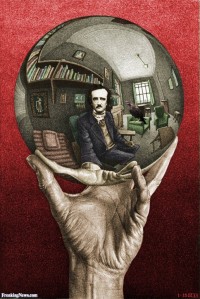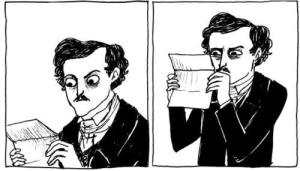Joker Poe, Part 5: The Jingle Man
“Ha! ha! ha! – he! he! – a very good joke indeed – an excellent jest. We will have many a rich laugh about it at the palazzo – he! he! he! – over our wine – he! he! he!”
These giggling words are among the last uttered by Fortunato, the rather unfortunate victim of a deadly practical joke in Edgar Allan Poe’s memorable tale, “The Cask of Amontillado.” In that short story, the narrator Montresor directly discloses neither the “thousand injuries” he’d received from Fortunato nor the final “insult” that led him to vow revenge, but he does present his plan as the solution to a puzzle: “I must punish, but punish with impunity. A wrong is unredressed when retribution overtakes its redresser. It is equally unredressed when the avenger fails to make himself felt as such to him who has done the wrong.” In other words, Montresor must take his revenge upon Fortunato in such a way that the victim knows all, while the perpetrator is in no danger of being caught. Montresor’s elaborate charade with the wine, the catacombs, the trowel, and the stones reveals his ingenious solution. As is well known, Poe himself took great pride in his analytical, puzzle-solving abilities, and Montresor’s plot reveals a certain gift for ratiocination that Poe valued. At the final moment, after Fortunato has been almost completely immured, Montresor calls his name. “There came forth in return only a jingling of the bells.” And thus is buried another “jingle man.”
In this series of posts, “Joker Poe,” I have argued that Poe is best viewed as a literary prankster, a practical joker who employed his prodigious intellect, his acute awareness of the marketplace, and his gifts for writing to satirize the culture and society of his era. In a sense, his own readers are suckered in by his tales, poems, and criticism, while Poe himself is likely having a chuckle at their expense. Poe was the great theorist of “Diddling,” which he considered as one of the exact sciences, and he insisted that no diddle—a swindle, confidence-game, or prank—is complete without a “grin,” but only one that the diddler himself wears, seen by no one else. Poe’s propensity for diddling extended to his literary career, which can be seen not only in those works which are clearly hoaxes, but also in his poetry, his tales, and his criticism. Not surprisingly, Poe made enemies, some of whom have not been so sanguine in accepting the thousand injuries and uncounted insults visited upon them by the grinning diddler.
After Rufus Griswold, whose calumnious portrait of Poe in an obituary caused outrage but likely led to Poe’s eventual enshrinement in a popular-cultural canon, perhaps the most famous of the fabled detractors of Poe during his lifetime was also America’s leading public intellectual, Ralph Waldo Emerson. The phrase “jingle man” is well known in American literary studies, not to mention infamous in Poe Studies, as Emerson’s dismissive appraisal of Poe. That the Sage of Concord might dislike Poe is not surprising, since Poe was probably as ardent an opponent of Emersonian transcendentalism as anyone other than Herman Melville, and Poe’s invectives were especially caustic when it came to the Boston literati, many of whom appeared to be well-nigh slavishly devoted to Emerson’s thought. Poe also criticized Emerson himself as belonging to “class of gentlemen with whom we have no patience whatever—the mystics for mysticism’s sake.” In a follow-up to Poe’s eccentric little series on “Autography,” in which he proposed to analyze the handwriting of famous authors, Poe humorously suggested that “[t]he best answer to his twaddle is cui bono? […] to whom is it a benefit? If not to Mr. Emerson individually, then surely to no man living.”
Joker Poe, Part 2: The Poet as Prankster
In my last post, I suggested that Edgar Allan Poe was essentially a practical joker. That is, although he remains best known today for tales of terror and mystery, of the Grotesque and Arabesque, Poe in his own time was very much a satirist or humorist. Not infrequently, the joke is on us, the readers, who are duped into believing the most incredible things, as becomes embarrassingly clear in “The Balloon-Hoax” or “The Facts in the Case of M. Valdemar,” for example. After all, Poe was the philosopher who was able to explicate “diddling” – that is, tricking or swindling – as “one of the exact sciences.” In his various hoaxes, satires, and “diddles,” Poe proved himself to be an accomplished prankster, which unsurprisingly stood him in good stead in the bumptious literary marketplace of his era.
Less obvious, perhaps, is the way that Poe the Poet might also be considered a practical joker. Poe’s poetry, unlike his more well-known prose tales, is generally thought to represent the Romantic ideals of supernal beauty. In the best poems, Poe’s mastery of sound and sense helps to produce poems of haunting loveliness, as in “The Raven” or “Annabel Lee.” But, then, it should also be observed that many of his poems appear to be crudely imitative; Poe concedes that his earlier poems were essentially attempts to reproduce Byron, for instance. Some might be labeled failed experiments, while others appear to be downright awful. Who can listen to “The Bells” more than once without going mad? The pealing repetitions are so intensely jangling to the nerves that one can only conclude that such was the poet’s intention. The point of the poem is to drive us crazy! But even in Poe’s most successful poems, there is a lurking sense that Poe is putting one over on us. The reader of Poe’s poems must always be on guard, as one cannot shake the vague suspicion that the poetry may be an ornate armature upon which to hang a joke in poor taste. However, we can identify at least one poem in Poe’s corpus that is unquestionably also a practical joke: “O Tempora! O Mores!”
“O Tempora! O Mores!” is one of Poe’s earliest poems, although it was not published until years after his death. Its title, deriving from Cicero’s famous lament and translated “Oh, the times, Oh, the manners [or customs]!,” is already suggestive of humor in a modern context. The phrase is generally reserved for those satirizing the jeremiads of the era. Studying the poem more closely, we see that the jaunty doggerel appears to lampoon a single character, a handsome salesman or clerk who has charmed his lady customers, but who the poet recognizes as an unintelligent and unworthy “ass.” The poem was written sometime in 1826, when Poe was only 17 years old, and in my own reading I had taken it to be a satirical critique of the crass, commercial culture of the United States in the nineteenth-century. That is, like the biographer Kenneth Silverman, who noted the poem’s “scorn toward the clerk as a plebian vulgarian, and its contempt for the world of merchandising,” I saw the young poet in “O Tempora! O Mores!” as a Romantic bemoaning the unrefined, boorish, middle-class values of the day. Like nearly everyone else, I was perplexed about the final word of the poem, in which the speaker names his object of ridicule, “Pitts.” But, in the end, I was able to file this away as mildly interesting juvenilia.
However, I heard a fascinating talk by renowned scholar Richard Kopley at the 2014 MLA convention, which shed light on the backstory of the poem. (An abstract of the talk appears in The Edgar Allan Poe Review 14.2 [Autumn 2013]: 250–251.) Alas, I can offer only a teaser here based on my faulty memory of the presentation, but Professor Kopley is currently working on a scholarly biography of Poe, which I have no doubt will be well worth the wait. For now, let me just say that the poem “O Tempora! O Mores!” was the acid coup de grâce of an elaborate practical joke.
Joker Poe, Part 1: Just Diddling
Edgar Allan Poe remains one of the most popular writers in the history of American literature. In the twenty-first century, Poe finds himself at the center of movies, television shows, and internet memes; the very name or image of Poe can be considered “click-bait” on the web. Yet the pop-cultural version of Poe is not a very accurate picture of the man, as a number of Poe scholars (a.k.a. pedantic killjoys) like to point out. Although biographers reveal the man to have been a savvy, business-like, professional magazinist, someone who knew what sold in the literary marketplace and who gave the people what they wanted, most fans prefer to confuse Poe with some of his more memorable protagonists. Many readers envision Poe as a dark, brooding, Gothic madman, a visionary poet obsessed with waking nightmares, horror, and the mysteries beyond the grave. The author of “Ligeia,” “The Fall of the House of Usher,” “The Tell-Tale Heart,” and “The Raven” is assumed to be obsessed with premature burials, murder, and death. But what if this is all a ruse? What if, to employ a term that Poe uses with approval, Poe is “diddling” his audience. In Poe and the Subversion of American Literature: Satire, Fantasy, Critique, I argue that Poe is perhaps best viewed as a practical joker, a highly skilled literary prankster whose fundamental talent lay in putting one over on people. More frequently than we care to admit, the victims of these confidence games, these diddles, are us, the readers. While we are thrilled by otherworldly wonders, aghast at inhuman terrors, and in awe of supernal beauty, Poe is grinning.
Although Poe is best known and best loved as a figure of dark romanticism, he was also a humorist. In fact, Poe wrote far more pieces that could be considered humor or satire than those that would be called horror. If his first published tale (“Metzengerstein,” which actually could be viewed as a burlesque) was not intended to be comical, then his second (“The Duc De L’Omelette”) certainly was, and one of the last tales published during Poe’s lifetime, “X-ing a Paragrab,” was a silly little piece lampooning the newspaper or magazine industry itself. As David Galloway has pointed out, “comedies, satires, and hoaxes account for over half of his output of short stories.” (Significantly, Galloway’s observation appears in his introduction to a collection of short stories titled The Other Poe, whose title serves to emphasize the degree to which Poe is not widely known for his comedies and satires.) By numbers alone, one could argue that Poe was primarily a humorist, if sometimes a black humorist, and that his tales of terror or mystery were secondary to the main body of his collected works.




